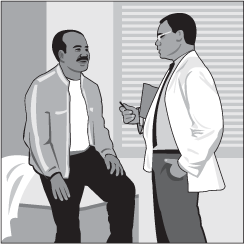Rectal Cancer
Treatment and Diagnosis:
If you have screening test results that suggest cancer or you have symptoms, your doctor must find out whether they are due to cancer or some other cause. Your doctor asks about your personal and family medical history and gives you a physical exam.
If your physical exam and test results do not suggest cancer, your doctor may decide that no further tests are needed and no treatment is necessary. However, your doctor may recommend a schedule for checkups.
If tests show an abnormal area (such as a polyp), a biopsy to check for cancer cells may be necessary. Often, the abnormal tissue can be removed during colonoscopy or sigmoidoscopy. A pathologist checks the tissue for cancer cells using a microscope.

Phone Numbers Reach Us -
India & International : +91 9371770341
Staging
If the biopsy shows that cancer is present, your doctor needs to know the extent (stage) of the disease to plan the best treatment. The stage is based on whether the tumor has invaded nearby tissues, whether the cancer has spread and, if so, to what parts of the body.
Your doctor may order some of the following tests:
- Blood tests: Your doctor checks for carcinoembryonic antigen (CEA) and other substances in the blood. Some people who have colorectal cancer or other conditions have a high CEA level.
- Colonoscopy: If colonoscopy was not performed for diagnosis, your doctor checks for abnormal areas along the entire length of the colon and rectum with a colonoscope.
- Endorectal ultrasound: An ultrasound probe is inserted into your rectum. The probe sends out sound waves that people cannot hear. The waves bounce off your rectum and nearby tissues, and a computer uses the echoes to create a picture. The picture may show how deep a rectal tumor has grown or whether the cancer has spread to lymph nodes or other nearby tissues.
- Chest x-ray: X-rays of your chest may show whether cancer has spread to your lungs.
- CT scan: An x-ray machine linked to a computer takes a series of detailed pictures of areas inside your body. You may receive an injection of dye. A CT scan may show whether cancer has spread to the liver, lungs, or other organs.
You may want to ask your doctor these questions before having a biopsy:
- How will the biopsy be done?
- Will I have to go to the hospital for the biopsy?
- How long will it take? Will I be awake? Will it hurt?
- Are there any risks? What are the chances of infection or bleeding after the biopsy?
- How long will it take me to recover? When can I resume a normal diet?
- How soon will I know the results?
- If I do have cancer, who will talk to me about the next steps? When?
Your doctor may also use other tests (such as MRI) to see whether the cancer has spread. Sometimes staging is not complete until after surgery to remove the tumor.
Doctors describe colorectal cancer by the following stages:
- Stage 0: The cancer is found only in the innermost lining of the colon or rectum. Carcinoma in situ is another name for Stage 0 colorectal cancer.
- Stage I: The tumor has grown into the inner wall of the colon or rectum. The tumor has not grown through the wall.
- Stage II: The tumor extends more deeply into or through the wall of the colon or rectum. It may have invaded nearby tissue, but cancer cells have not spread to the lymph nodes.
- Stage III: The cancer has spread to nearby lymph nodes, but not to other parts of the body.
- Stage IV: The cancer has spread to other parts of the body, such as the liver or lungs.
- Recurrence: This is cancer that has been treated and has returned after a period of time when the cancer could not be detected. The disease may return in the colon or rectum, or in another part of the body
Staging
If the biopsy shows that cancer is present, your doctor needs to know the extent (stage) of the disease to plan the best treatment. The stage is based on whether the tumor has invaded nearby tissues, whether the cancer has spread and, if so, to what parts of the body.
Your doctor may order some of the following tests:
- Blood tests: Your doctor checks for carcinoembryonic antigen (CEA) and other substances in the blood. Some people who have colorectal cancer or other conditions have a high CEA level.
- Colonoscopy: If colonoscopy was not performed for diagnosis, your doctor checks for abnormal areas along the entire length of the colon and rectum with a colonoscope.
- Endorectal ultrasound: An ultrasound probe is inserted into your rectum. The probe sends out sound waves that people cannot hear. The waves bounce off your rectum and nearby tissues, and a computer uses the echoes to create a picture. The picture may show how deep a rectal tumor has grown or whether the cancer has spread to lymph nodes or other nearby tissues.
- Chest x-ray: X-rays of your chest may show whether cancer has spread to your lungs.
- CT scan: An x-ray machine linked to a computer takes a series of detailed pictures of areas inside your body. You may receive an injection of dye. A CT scan may show whether cancer has spread to the liver, lungs, or other organs.
Your doctor may also use other tests (such as MRI) to see whether the cancer has spread. Sometimes staging is not complete until after surgery to remove the tumor.
Doctors describe colorectal cancer by the following stages:
- Stage 0: The cancer is found only in the innermost lining of the colon or rectum. Carcinoma in situ is another name for Stage 0 colorectal cancer.
- Stage I: The tumor has grown into the inner wall of the colon or rectum. The tumor has not grown through the wall.
- Stage II: The tumor extends more deeply into or through the wall of the colon or rectum. It may have invaded nearby tissue, but cancer cells have not spread to the lymph nodes.
- Stage III: The cancer has spread to nearby lymph nodes, but not to other parts of the body.
- Stage IV: The cancer has spread to other parts of the body, such as the liver or lungs.
- Recurrence: This is cancer that has been treated and has returned after a period of time when the cancer could not be detected. The disease may return in the colon or rectum, or in another part of the body
Phone Numbers Reach Us -
India & International : +91 9371770341





































